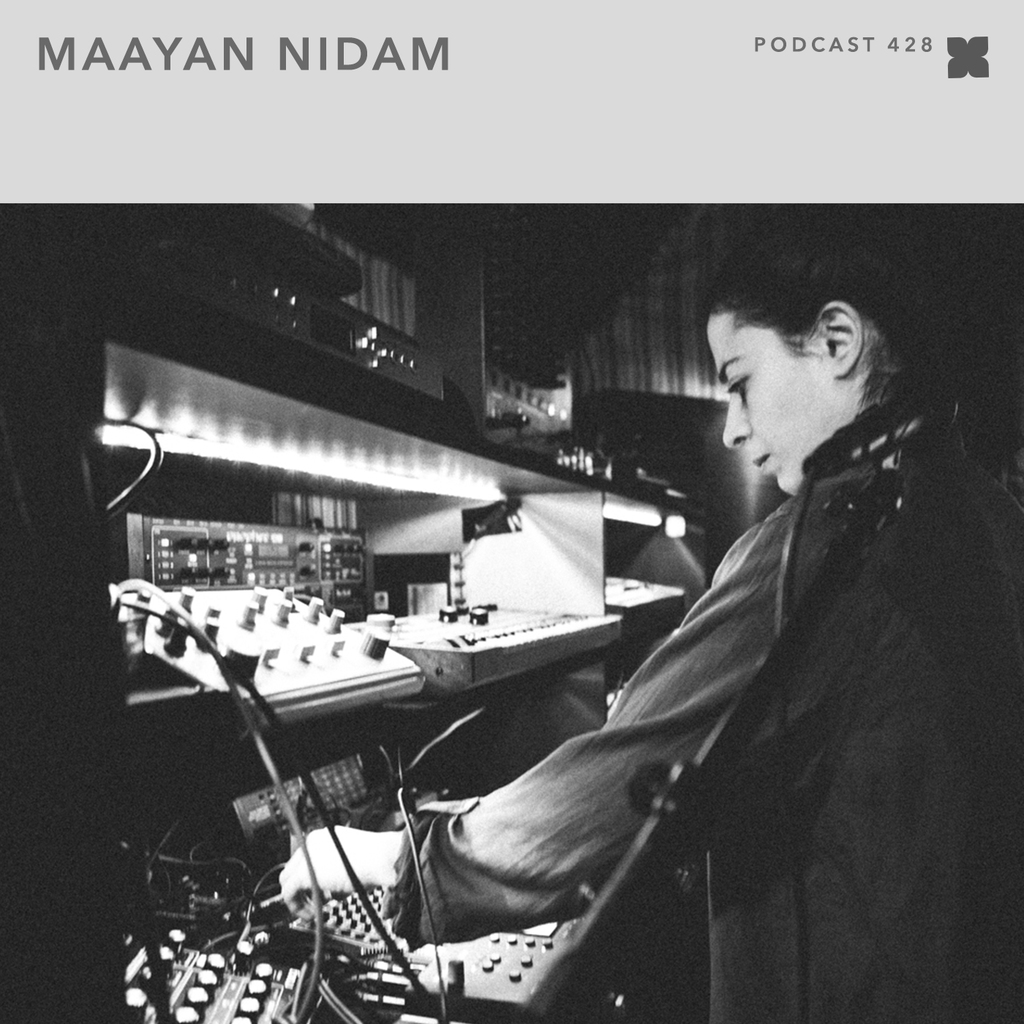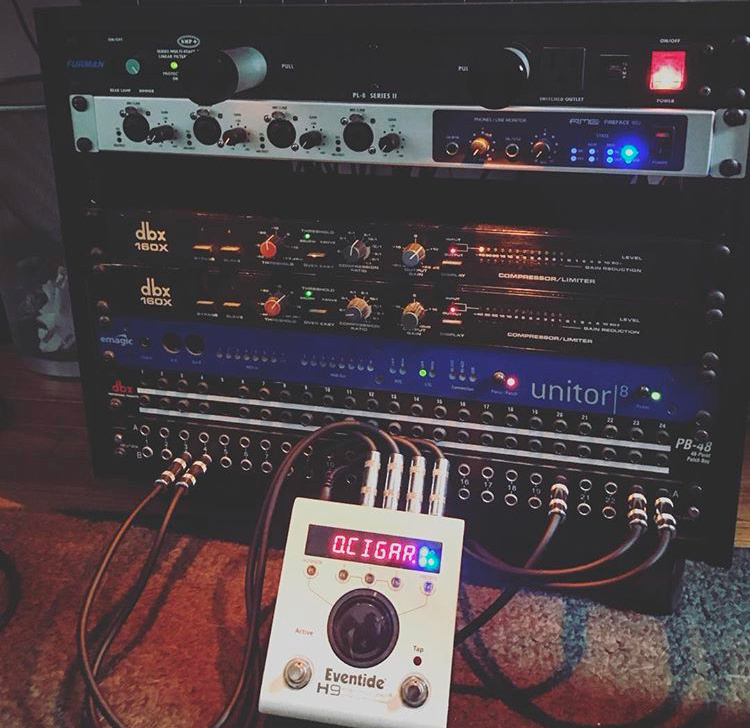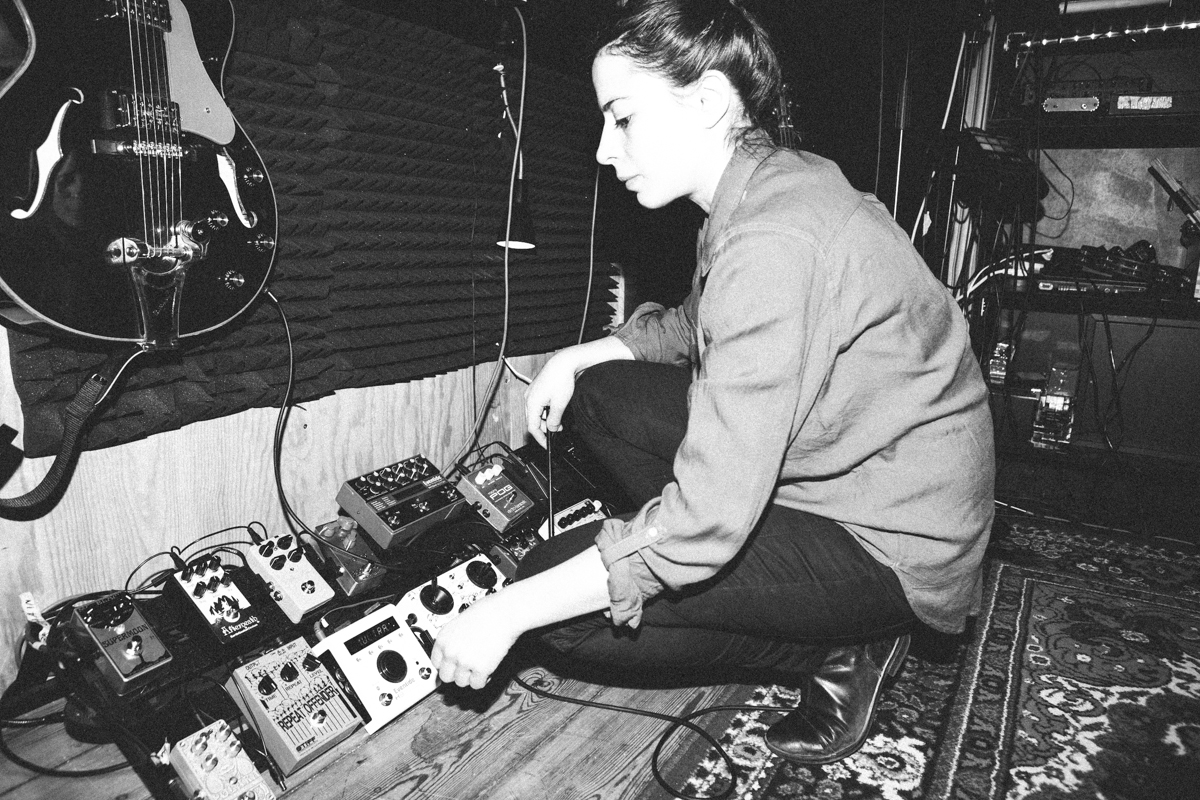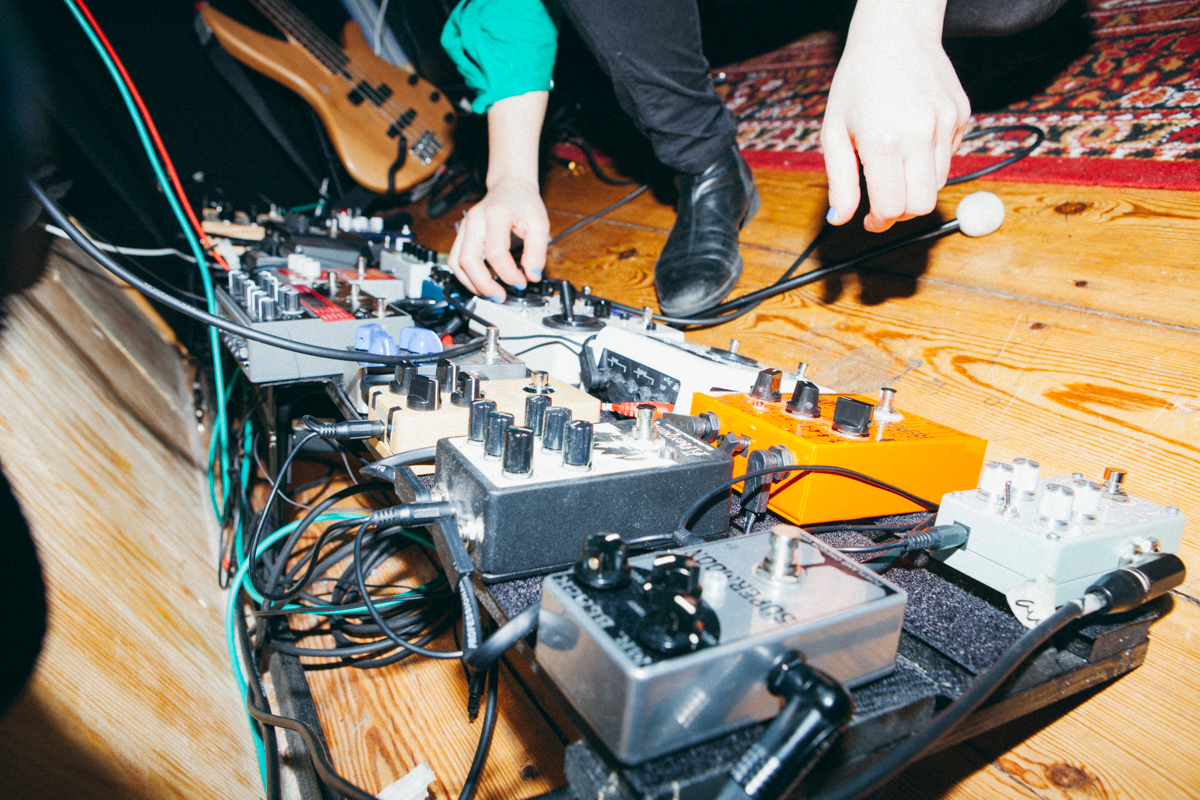Podcast 428: Maayan Nidam
The exceptionally versatile DJ-producer shows us the fruits of her recent labors.

Podcast 428: Maayan Nidam
The exceptionally versatile DJ-producer shows us the fruits of her recent labors.

It’s our policy over here at XLR8R not to combine lengthy artist introductions with the weekly podcasts. Brief questions, limited only to the concept and intentions around the mix, will normally be accompanied by some essential details and a tracklisting—but we feel that the inclusion of anything more substantial can distract readers away from the music itself. But rules, they say, are made to be broken, and this week’s submission—coming from the wonderfully talented Israeli DJ-producer Maayan Nidam—provided the perfect opportunity for us to make an exception.
Sitting down with her in her warm and cozy analog-heavy studio space, nestled in one of the many abandoned rooms above Renate nightclub in the East of Berlin, offered a rare insight into the thought processes behind her diverse career thus far and long-term ambitions as a recording artist. In this particular case, the addition of the following body of text serves as a necessary accompaniment to the one-hour mix below, adding context to the music rather than taking focus away from it.
Having spent her earlier years in Tel Aviv, Israel, with brief stints in Amsterdam and New York, Nidam arrived in Berlin in 2004. It was, she says, a “desperate move,” motivated, above all, by a need to “move forward” rather than pursue any particular musical endeavor. “I needed to move, to see somewhere else and to get away from everything. It had nothing to do with trying to become a successful musician,” she says. “DJing was just something that I could do.”
Over time, as she struggled to settle in a place where she had limited knowledge of the local dialect, music, she explains, became her main vehicle of communication with people in the scene. “I just spent all my time going to parties and playing music,” she recalls. Production, too, at this point began to grow. Releases, under a plethora of different monikers—including Laverne Radix, Miss Fitz and Mara Trax (her collaborative project with Vera)—became increasingly frequent, spanning from labels including Raum Music, Oslo, and Freak n’ Chic. Her first work under her own name landed in 2009, a debut full-length on Power Shovel Audio. This, she says, marked a point of maturity in her sound, and the first time she felt comfortable without an alias.

This diversity in Nidam’s discography is particularly striking. Although commonly referred to as a DJ-producer, the scope of her musical works is actually deserving of a wider term. Besides those numerous aforementioned dancefloor-focused projects—each of which, she says, covers a specific and clearly identifiable sound—there have been two bands with which she has been involved, namely The Kicks and The Waves & Us.
The former, an entirely improvisational project alongside Alex Picone, is set to follow up a 2013 release with a second EP later this year. The latter, although now broken up, was a post-punk collaboration that saw a solitary release on the Wolf & Lamb imprint in 2013. “I am not proud of it [diversity], but I am not not proud of it,” she says. “It’s just been necessary for me.” Although symbolic of a exceptionally versatile musician, Nidam acknowledges that “her inability to focus on one project” for any considerable time has “made everything slower.” “It’s definitely holding me back,” she says. “It’s taking me longer to grow—but I am not so preoccupied with confusing promoters; it concerns me more that I grow as an artist.”
The source of this desire to indulge in this diverse range of projects can be traced back to Nidam’s childhood. Born into a “very musical family,” she recalls spending time just listening to music with her father, an avid record collector who “spent a good few months’ salary” on the family sound-system. This, she explains, gave her a different understanding of music than those who grow up listening to that which fits comfortably within the electronic realm.
“When you grow up listening to Pink Floyd, Bryan Eno, and Led Zeppelin, I think you have different standards of what good music is,” she says. “This always made me look for other band projects—something away from just club music.” Her SoundCloud page, too, includes several mixes that are distanced considerably from the house and techno genre with which she is so commonly associated, another attempt, she reveals, to express and capture the true artistry with which she had become so infatuated during her earlier years in Israel.
“There is always a voice in your head. For long periods, mine was telling me that club music isn’t real music. If you consider yourself a true artist then sometimes that isn’t enough.”
The strength of this compulsion to explore wider musical realms was increased only by an overloaded schedule and a desire to search for her own validation. “I wasn’t satisfied doing what everyone else was doing,” she explains. “There are so many records that are produced to be played in clubs, and I didn’t think I had anything that I could add to it.” For many years, Nidam also explains that there was an inherent dissatisfaction with life as a touring artist. “I quickly became jaded,” she says. “I wasn’t unhappy with what I was doing, but I was gigging too much,” she adds. “Being in these club environments and listening to that music does something to you.” Traveling from city to city, week after week, seeing people who “just wanted to get high and get laid” compounded a lingering feeling that “club music was a lower state of art,” she explains. “There is always a voice in your head. For long periods, mine was telling me that club music isn’t real music,” she adds. “If you consider yourself a true artist then sometimes that isn’t enough.”
Finding herself searching for contentment, she consciously reduced her schedule to allow herself to spend more time record-hunting and producing music in the studio. The importance of her band work, namely that of The Waves & Us, only grew because it challenged her, offering an invaluable sense of artistic affirmation that had become so glaringly absent in her other projects.
“I feel like I have spent a long time looking around looking for something that is better than techno because I didn’t have a lot of respect for it—but now I feel like I understand it so much better. I don’t feel above it in any way.”
Now, however, things are different. On several occasions during our conversations she expresses that she is the “happiest” she has been in several years. Studio-time, she explains, is sufficient enough to allow her to explore all her artistic whims—both club-related and otherwise—and she has discovered a deeper appreciation for techno music. “Techno has always been magical to me—but I feel closer to it now than ever before,” she explains. “I feel like I have spent a long time looking around looking for something that is better than techno because I didn’t have a lot of respect for it—but now I feel like I understand it so much better. I don’t feel above it in any way.”
In addition to this, her work with The Kicks serves as an important counter-weight to her club-oriented works. Having spent the last 12 months focusing almost entirely on techno, she has a wealth of new material scheduled for release, some through Nina Kraviz’ трип imprint—including “Infinite Rattle,” which was recently played out on Kraviz’ BBC Radio 1 residency mix. Her sets and mixes, as evidenced in the podcast she has compiled for us below, will be indicative of this new-found desire to invest more time in one particular genre.
To understand the reasons behind this decision, it’s necessary to wind back to 2014. Focus, back then, was almost entirely on The Waves & Us, a project in which she invested great amounts of time and effort to record the band’s first full-length. “Everything [at the time] was really amazing. It all felt so natural,” she explains. The album, although it was cut and mastered, never saw release due to the unfortunate break up of the band, which consequentially put too much strain on Nidam’s relationship with the then lead singer. “That was a big turning point for me,” Nidam explains. “It left me with a lot of question marks; I wasn’t really sure where to go from there.”
Needing to change things up, she subsequently canceled her remaining gigs, and changed booker to the Geist agency. “I needed to be alone,” she recalls. “I needed to start something new by myself.” Her studio, which she completely renovated, became her new playground, an invaluable escape where she recorded numerous sketches, none of which have been released because they are too “dark.” It was this latter change, accompanied by the encouragement of close friend Thomas Franzmann (a.k.a. Zip), she reveals, that ultimately inspired her to pursue a solo live set—which is set to debut at this Friday’s Get Perlonized showcase, before heading to Mutek Montreal in June—and invest further in one particular project—a “big step,” given that she had never managed to give that much attention to any of her previous chosen endeavors. “I can’t tell you why, but I had this strong inclination to move back and focus on my techno,” she says. “It has just started connecting with me on a deeper level than before,” she adds. “I’ve suddenly found myself going to Berghain alone on Sundays.”


This being said, it would easy to brand this something of akin to a drastic change of course—but Nidam is keen to point out that she has long been inclined to make the aforementioned changes. “I’ve always known that I had to move forward and be more focused—I told people that all the time,” she says. “Otherwise I was worried it would be another decade of me DJing and touring and releasing some records without going any deeper.” The live set has been on her mind for much of her career, but it never gave her the “same excitement as playing records,” and so she has never quite invested the time and energy required of it.
Although several of her releases, namely those on Perlon and Luciano’s Cadenza, are indicative of her undeniable gift for more minimal, micro-house production, techno—both in its abstract and the more traditional sub-forms—are the styles that have long resonated with her most positively. In her studio, positioned beside the numerous synthesisers, cables and guitars, are several guitar pedals, chained together in her own unique way to facilitate the production of these distorted, ambient-techno sounds for which she has always entertained an appreciation. She also reveals that many of the records she plays out today are those that she bought much earlier in her career. “Going back to techno feels almost symbolic,” she explains. “It feels like I am starting something new, but also going back to where it all started,” she adds. “I have learned so much about both myself and the music—and I feel like I can do better music now than ever before.” In this sense, the break up of the band and the relationship were something of a catalyst rather than anything more.
As for the fruits of this adjustment, Nidam explains that they are plentiful. It becomes clear from our conversations that investing all her time and energy in producing techno has been a considerable challenge, but one that has brought her much satisfaction and artistic growth. “It’s taken me out of my comfort zone,” she explains. “New sounds and techniques come up the more you work at a single sound, and then it clicks.” Unlike some producers who possess an apparent ability to churn out tracks at will, Nidam explains how she will spend days in the studio “reading or watching movies,” pushing her to further develop her work. “When you get through this [the barriers], that’s when the exciting stuff really starts to happen,” she says. “The longer I stay [in the studio], the better it is.” Once completed, each sketch will be taken downstairs for testing on the Renate sound-system, before returning to the studio for further fine-tuning.
None of this is to say, however, that Nidam’s minimal-house, or band, days are a thing of the past. For many, her releases on Perlon are the jewels of an already remarkable catalog of works. Techno, for now, remains for subject of her focus—and it is likely to for the near future—but she retains very close ties to the Frankfurt-based imprint and harbors intentions to return there in the near future. During our conversations, she plays a number of sketches that fall much closer to this realm than anything techno. Besides the impending release of The Kicks’ Rebirthday-Party EP, there will also be a live band tour and further productions are expected to surface soon thereafter. “I am really looking forward to the Spring so I can go back to making guitar music and play with pedals and escape from the club vibe,” she says. “It is a state of mind because it’s an entirely different process. In addition to this, she is also working on a number of other side collaborative projects, the exact details of which she is reluctant to reveal.
Nidam’s name on the XLR8R podcast schedule has been a source of excitement for many months—but the exact style of the mix was always going to be almost impossible to accurately predict in advance. After all, her name means different things to different people. Traditional techno, however, is not something with which she has ever been strongly associated, and so it came as something of a surprise when the file arrived in the inbox—but, in many ways, this very series exists to provide a snapshot into the artist’s mind and this, right now, is where Nidam’s focus lies. Her intention, following these changes above, was always to channel this diverse spectrum of influences to her disposal to “make her own niche of music”—and, judging by by the varied nature of the mix alone, it would seem that she in well on the path to achieving just this.

